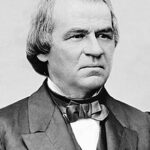The Andrew Johnson Impeachment Crisis
President Andrew Johnson faced impeachment charges on February 24, 1868. The House voted 126-47 to impeach America’s first president. Johnson’s removal of Secretary of War Edwin Stanton triggered the constitutional crisis. ⚖️
Violation of the Tenure of Office Act
Johnson dismissed Stanton without Senate approval on February 21, 1868. The Tenure of Office Act required Senate consent for cabinet removals. Congress passed this law specifically to protect Radical Republicans in Johnson’s administration. Johnson believed the act was unconstitutional and deliberately challenged it.
Reconstruction Policy Conflicts
The Andrew Johnson impeachment stemmed from deeper political conflicts over Reconstruction. Johnson favored lenient policies toward the defeated Confederacy. Radical Republicans demanded harsh measures and civil rights protections for freed slaves. Johnson vetoed key Reconstruction legislation, enraging Republican lawmakers. 🔥
Political Motivations Behind Impeachment
Republican leaders saw impeachment as their only option to remove Johnson. They controlled both houses of Congress with veto-proof majorities. Johnson’s policies threatened their Reconstruction agenda and Republican electoral prospects. The crisis represented a fundamental struggle over presidential versus congressional power. 📊
Impact:
Senate Trial and Near Removal
The Senate trial began on March 5, 1868, lasting eleven weeks. Johnson avoided removal by a single vote on May 16, 1868. Seven Republican senators voted against conviction, showing political courage. The final vote was 35 guilty to 19 not guilty, one short of the required two-thirds majority. 🔥
Constitutional Precedent Established
The Andrew Johnson impeachment established crucial constitutional precedents. It demonstrated that impeachment required serious constitutional violations, not mere policy disagreements. The narrow acquittal showed the high bar for presidential removal. Future impeachment proceedings would reference this historic case as the constitutional standard.
Reconstruction Policy Consequences
Johnson’s weakened presidency accelerated Radical Reconstruction policies. Congress passed the Fourteenth and Fifteenth Amendments during this period. Military Reconstruction Acts reshaped the South under federal oversight. Johnson’s lame-duck status after impeachment eliminated his ability to obstruct Republican legislation. 📊
Long-term Political Impact
The crisis permanently altered executive-legislative relations in America. It established impeachment as a viable check on presidential power. The partisan nature of the proceedings created lasting precedents for future impeachment cases. Johnson’s presidency became a cautionary tale about the limits of presidential authority during national crises. 🌍
